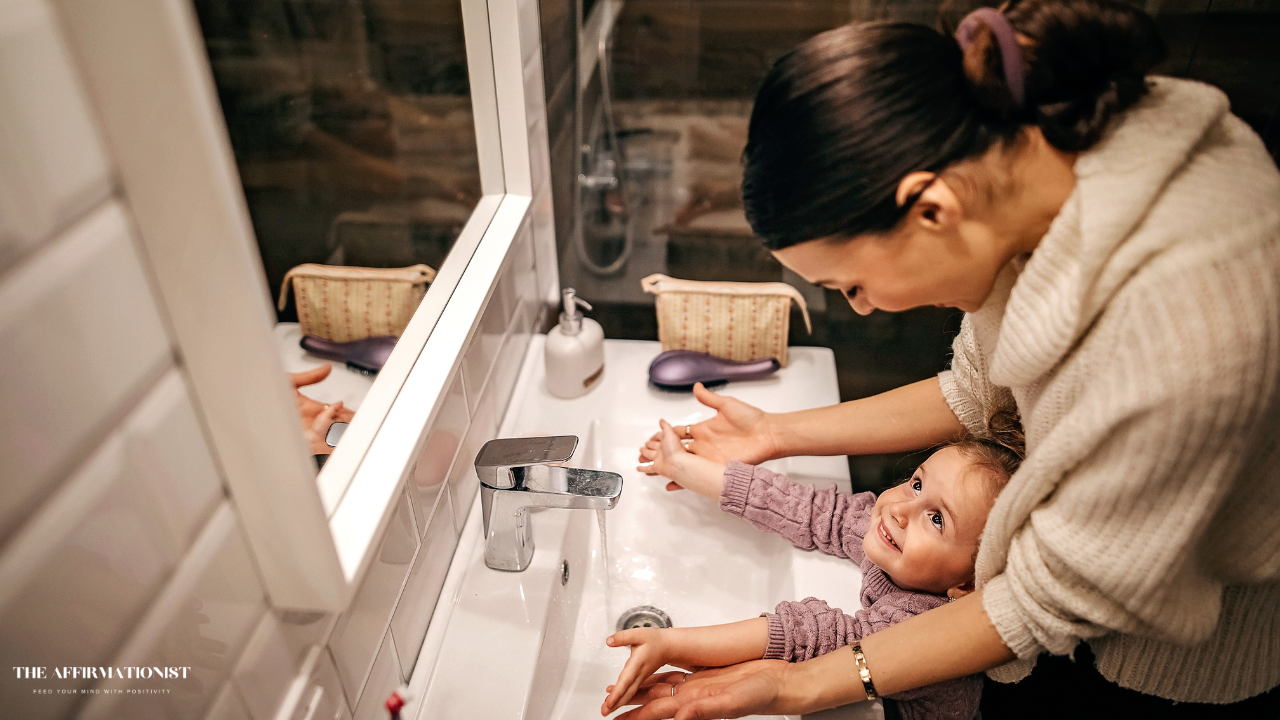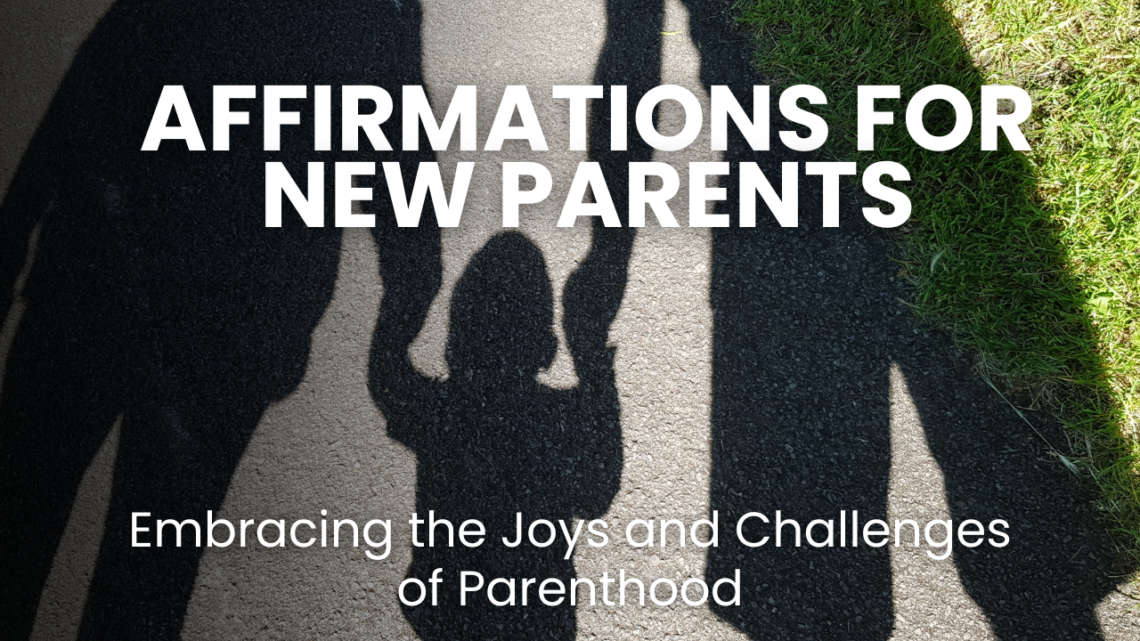Becoming a parent is a monumental life shift. It’s a journey filled with immeasurable joy, overwhelming love, and, let’s be honest, a healthy dose of challenges. Navigating this new terrain can feel like traversing uncharted territory, often leaving new parents feeling overwhelmed, exhausted, and questioning their abilities. In these moments of uncertainty, the power of positive affirmations can be a lifeline. This comprehensive guide explores the profound impact of affirmations for new parents, offering a toolkit of empowering statements to help you embrace the joys and navigate the challenges of parenthood with confidence and grace.
The Power of Positive Affirmations in Parenthood

Becoming a parent is a profound transition, a complete reshaping of one’s identity and daily life. This period is often marked by a rollercoaster of emotions: intense love and joy intertwined with exhaustion, anxiety, and self-doubt. In this vulnerable and transformative time, the practice of positive affirmations can act as a powerful anchor, providing stability and support.
Here’s a more detailed exploration of the benefits:
- Counteracting Negative Self-Talk and Limiting Beliefs: Parenthood, particularly in its initial stages, can be a breeding ground for negative self-talk. Thoughts like “I’m not doing this right,” “I’m a bad parent,” or “I’m failing my baby” can creep in, eroding self-confidence and increasing stress. These negative thoughts often stem from societal pressures, unrealistic expectations, and the sheer intensity of caring for a newborn. Affirmations directly challenge these negative narratives. By consciously choosing positive and empowering statements, parents can begin to rewire their thinking patterns, replacing self-criticism with self-compassion and belief in their abilities. This process helps dismantle limiting beliefs that hinder personal growth and positive parenting.
- Reducing Stress Hormones and Promoting Emotional Well-being: The constant demands of caring for a baby, coupled with sleep deprivation and hormonal fluctuations (especially for postpartum mothers), can lead to elevated stress hormones like cortisol. Chronic stress can negatively impact both physical and mental health. Affirmations can help regulate the stress response by activating the parasympathetic nervous system, responsible for the “rest and digest” response. Repeating calming and reassuring affirmations can lower cortisol levels, promoting feelings of relaxation, peace, and emotional stability. This, in turn, can improve mood, reduce anxiety, and enhance overall well-being.
- Building Resilience and Coping Mechanisms: Parenthood is inherently unpredictable. There will be challenging days, fussy babies, sleepless nights, and moments of feeling overwhelmed. Affirmations can help build resilience, the ability to bounce back from adversity. By consistently reinforcing positive beliefs about their capabilities and inner strength, parents develop a stronger sense of self-efficacy. This empowers them to face challenges with greater confidence and develop healthier coping mechanisms for managing stress and difficult situations. Affirmations remind them that they have the inner resources to navigate the ups and downs of parenthood.
- Enhancing Self-Compassion and Reducing Guilt: The pressure to be a “perfect” parent can be immense, leading to feelings of guilt and inadequacy when things don’t go as planned. Affirmations promote self-compassion by encouraging parents to treat themselves with the same kindness and understanding they would offer a friend. Affirmations like “I am doing my best,” “It’s okay to make mistakes,” and “I am learning and growing every day” can help alleviate guilt and foster a more accepting and forgiving attitude towards oneself. This self-compassion is crucial for maintaining mental and emotional well-being during the challenging early years of parenthood.
- Creating a Positive Cycle of Interaction with Your Child: A parent’s mindset directly influences their interactions with their child. When parents approach parenting with a positive and confident mindset fostered by affirmations, they are more likely to create a nurturing, responsive, and loving environment. A calm and confident parent is better equipped to attune to their baby’s needs, respond sensitively to their cues, and provide consistent care. This positive cycle of interaction strengthens the parent-child bond, promotes healthy development, and creates a foundation of trust and security.
- Promoting a Growth Mindset in Parenting: Affirmations can help parents adopt a growth mindset, the belief that abilities and intelligence can be developed through dedication and hard work. This is particularly important in parenting, where learning and adapting are constant processes. By affirming statements like “I am learning and growing as a parent every day” or “I am open to new approaches and strategies,” parents embrace challenges as opportunities for growth and view setbacks as learning experiences. This mindset fosters resilience, perseverance, and a more positive approach to parenting.
In essence, positive affirmations are not just empty words; they are tools for rewiring the brain, shifting perspectives, and cultivating a more positive and empowering experience of parenthood. They help parents navigate the challenges with greater confidence, resilience, and self-compassion, ultimately creating a more nurturing and loving environment for both themselves and their children.
Crafting Effective Affirmations

Creating affirmations that truly resonate and bring about positive change requires more than just stringing together positive words. It involves understanding the psychology behind affirmations and applying specific techniques to maximize their impact. Here’s a more detailed breakdown:
- “I” Statements: Personalizing the Message: Using “I” statements is crucial because it makes the affirmation personal and directly applicable to you. It’s about owning the statement and internalizing the message. For instance, instead of saying “Parents are patient,” which is a general statement, saying “I am patient” makes it a personal declaration of your own capacity for patience. This personalization strengthens the connection between the affirmation and your self-perception.
- Specificity: Targeting Your Needs: General affirmations can be helpful, but specific affirmations are far more powerful. They address particular challenges or areas where you want to see improvement. For example, instead of a broad statement like “I am a good parent,” which can be vague and open to interpretation, try “I am providing my baby with loving and consistent care,” which is more concrete and focuses on specific actions. The more specific the affirmation, the clearer the message you’re sending to your subconscious mind.
- Present Tense: Creating a Sense of Reality: Phrasing affirmations in the present tense is essential because it creates a sense of immediacy and reality. It’s about affirming that the desired state is already true, even if it doesn’t fully feel that way yet. This helps to bypass the critical mind and plant the seed of the positive belief in the subconscious. For instance, instead of saying “I will be a confident parent,” say “I am a confident parent.” This subtle shift in tense makes a significant difference in how the affirmation is perceived and internalized.
- Positive Framing: Focusing on What You Want, Not What You Don’t Want: Affirmations should always be phrased positively, focusing on what you want to achieve or experience, rather than what you want to avoid. Avoid using negative words like “not,” “no,” or “don’t.” For example, instead of saying “I will not be stressed,” say “I am calm and centered.” The subconscious mind tends to focus on the key words, so using negative words can inadvertently reinforce the very thing you’re trying to avoid.
- Emotional Connection: Adding Feeling to Your Words: The effectiveness of affirmations is significantly enhanced when you connect with them emotionally. When you repeat an affirmation, try to feel the emotion associated with it. For example, when saying “I am filled with love for my child,” try to genuinely feel that love in your heart. This emotional connection makes the affirmation more impactful and helps to imprint it more deeply in your subconscious.
- Short and Memorable: Easy to Recall and Repeat: Short, concise affirmations are easier to remember and repeat throughout the day. This repetition is crucial for reinforcing the positive message and making it a part of your thinking patterns. Aim for affirmations that are easy to recall and that resonate with you on a personal level.
- Authenticity and Belief: Speaking Your Truth: Perhaps the most crucial aspect of crafting effective affirmations is ensuring they are authentic and that you genuinely believe in them. If you’re saying an affirmation that you don’t truly believe, it’s unlikely to have a significant impact. Start with affirmations that feel believable and gradually work towards more challenging ones as your belief grows. It’s okay to start small and build upon your belief system over time.
- Tailoring to Specific Parenting Challenges: As discussed previously, tailoring affirmations to address specific parenting challenges is highly beneficial. Consider the particular struggles you’re facing, such as sleep deprivation, managing a fussy baby, or feeling overwhelmed by household chores. Craft affirmations that directly address these challenges, offering solutions and promoting positive coping mechanisms.
Examples of Refining Affirmations:
Let’s illustrate how to refine general statements into powerful affirmations:
- General Statement: I want to be a better parent.
- Refined Affirmation: I am a loving and nurturing parent, providing my child with the support and guidance they need to thrive.
- General Statement: I don’t want to be so stressed.
- Refined Affirmation: I am calm, centered, and able to handle the demands of parenthood with grace and ease.
- General Statement: I wish my baby would stop crying.
- Refined Affirmation: I am patiently comforting my baby and meeting their needs with love and understanding.
By applying these principles, you can craft affirmations that are not just positive statements, but powerful tools for transforming your mindset and enhancing your parenting experience. They become a personalized mantra that supports you through the beautiful and challenging journey of parenthood.
Affirmations for Specific Parenting Challenges



Parenthood presents a unique set of challenges, and tailoring affirmations to address specific situations can be particularly helpful. Here are some examples:
For Overwhelm and Exhaustion:
- I am strong and capable, even when I feel tired.
- I am allowed to ask for help and support.
- I am taking things one day at a time.
- This phase is temporary, and I will get through it.
- I am prioritizing my well-being and taking moments to rest.
For Self-Doubt and Insecurity:
- I am the best parent for my child.
- I trust my instincts and intuition.
- I am learning and growing as a parent every day.
- Mistakes are a part of the learning process, and they don’t define me.
- I am doing my best, and that is enough.
For Managing Baby’s Crying and Fussy Periods:
- I am calm and patient, even when my baby is crying.
- I am providing comfort and reassurance to my baby.
- I am attuned to my baby’s needs and doing my best to meet them.
- This is a normal phase, and it will pass.
- I am holding space for my baby’s emotions.
For Balancing Personal Needs with Parenting Responsibilities:
- I am worthy of taking time for myself.
- I am prioritizing self-care to be the best parent I can be.
- I am finding balance in my life as a parent and as an individual.
- My needs are important too.
- I am setting healthy boundaries.
For Partner Relationships:
- We are a strong team, navigating parenthood together.
- We communicate openly and support each other.
- Our love for each other is strengthened by our love for our child.
- We prioritize our relationship and make time for connection.
- We are patient and understanding with each other as we adjust to our new roles.
Affirmations for Different Stages of Infancy:
Newborn Stage (0-3 Months):
- I am bonding deeply with my newborn.
- I am learning my baby’s cues and responding to their needs.
- I am embracing the newborn snuggles and cherishing these precious moments.
- I am navigating the sleepless nights with grace and resilience.
- I am creating a safe and loving environment for my baby.
Infant Stage (3-12 Months):
- I am celebrating my baby’s milestones and development.
- I am fostering my baby’s curiosity and exploration.
- I am providing a stimulating and nurturing environment for my baby’s growth.
- I am adapting to my baby’s changing needs.
- I am enjoying the playful interactions and growing connection with my baby.



Incorporating Affirmations into Your Daily Routine

While the idea of incorporating affirmations is appealing, finding the time and mental space to do so as a new parent can feel challenging. The key is to find small pockets of time and link affirmations to existing routines. Here’s a more detailed exploration of practical strategies:
- Morning Ritual: Setting a Positive Tone for the Day: Starting your day with affirmations can set a positive tone and influence your mindset throughout the day. Even if you only have a few minutes, reciting a few affirmations while brushing your teeth, making coffee, or getting dressed can be incredibly beneficial. Consider keeping a small card with your chosen affirmations on your bathroom mirror or bedside table as a visual reminder.
- During Baby’s Naps or Quiet Playtime: These pockets of relative quiet can be ideal times to practice affirmations. While your baby is napping or engaged in independent play, take a few moments to yourself. Find a quiet space, take a few deep breaths, and repeat your affirmations. This can be a calming and restorative practice for both you and your baby, as your calm energy can often be felt by them.
- While Feeding or Rocking Your Baby: These repetitive tasks offer a natural opportunity to incorporate affirmations. While feeding your baby, either by breast or bottle, or while rocking them to sleep, you can silently or quietly repeat your affirmations. This can be a soothing practice for both you and your baby, creating a sense of connection and calm.
- Before Bed: Reflecting and Releasing: Ending your day with affirmations can help you reflect on the day’s experiences and release any stress or negativity. Before going to sleep, take a few minutes to review your affirmations and focus on the positive aspects of your day. This can promote a more restful and peaceful sleep.
- Throughout the Day: Triggering Reminders: Life with a baby can be unpredictable, so relying solely on scheduled times might not always be feasible. Instead, try using triggers or cues throughout the day to remind you to practice affirmations. These triggers could be:
- Specific Activities: Every time you change a diaper, start a load of laundry, or wash your hands, use it as a trigger to repeat a short affirmation.
- Emotional Cues: When you feel overwhelmed, stressed, or frustrated, use these feelings as a cue to pause, take a few deep breaths, and repeat a calming affirmation.
- Visual Reminders: Place sticky notes with your affirmations in strategic locations, such as on the changing table, the refrigerator, the dashboard of your car, or by the sink.
- Combining with Other Practices: Integrating affirmations with other mindfulness practices can amplify their effect. Consider combining affirmations with:
- Deep Breathing: Take a few deep breaths while repeating your affirmations to further calm your nervous system.
- Meditation: Incorporate affirmations into your meditation practice to deepen your connection to the positive messages.
- Visualization: Visualize yourself embodying the qualities you are affirming while repeating the affirmations.
- Creating an Affirmation Journal: Keeping a journal dedicated to your affirmations can be a powerful tool. Write down your chosen affirmations, reflect on how they make you feel, and track your progress over time. You can also use the journal to explore new affirmations or refine existing ones.
- Using Technology: Several apps and online resources offer guided meditations and affirmation programs. These can be helpful for those who prefer a structured approach or find it difficult to create their own affirmations. You can also set reminders on your phone to prompt you to practice affirmations throughout the day.
- Be Patient and Persistent: It’s important to remember that it takes time and consistent practice to see the full benefits of affirmations. Don’t get discouraged if you don’t notice immediate changes. Be patient with yourself, keep practicing regularly, and trust the process.
Example of a Daily Affirmation Schedule for a New Parent:
- Morning: While brushing teeth: “I am a capable and loving parent.”
- Mid-morning (while baby plays): “I am present and engaged with my baby.”
- During feeding: “I am nourishing my baby with love and care.”
- Afternoon (when feeling overwhelmed): “I am calm and centered, I can handle this.”
- Before bed: “I am grateful for this day and the love I share with my child.”
By implementing these strategies and finding what works best for your individual circumstances, you can effectively integrate affirmations into your daily routine and reap the many benefits they offer for new parents. Remember, even small, consistent efforts can make a significant difference in your mindset and overall well-being.
Beyond Affirmations: Building a Supportive Network

Parenthood, especially in the early stages, can feel isolating. The constant demands of caring for a newborn, coupled with sleep deprivation and hormonal shifts, can make it difficult to maintain social connections and prioritize self-care. This is where a strong support network becomes essential. It provides a buffer against stress, offers practical assistance, and reminds you that you’re not alone in this journey.
Here’s a more detailed exploration of building a supportive network:
- Connecting with Other Parents: Shared Experiences and Validation: Connecting with other parents, especially those with children of similar ages, can be incredibly validating. Sharing experiences, exchanging tips, and simply knowing that others are going through similar challenges can alleviate feelings of isolation and normalize the ups and downs of parenthood. Consider joining:
- New Parent Groups: These groups offer a safe and supportive space to connect with other new parents, share experiences, and learn from each other.
- Online Forums and Communities: Online platforms can provide a convenient way to connect with other parents from the comfort of your own home.
- Local Playgroups: As your child grows, playgroups offer opportunities for both you and your child to socialize and connect with others.
- Leaning on Family and Friends: Practical and Emotional Support: Family and friends can provide invaluable support in various ways:
- Practical Assistance: Asking for help with tasks like grocery shopping, meal preparation, or household chores can free up time and energy for you to focus on caring for your baby and yourself.
- Emotional Support: Talking to trusted family members or friends about your feelings and experiences can provide emotional release and validation.
- Respite Care: Asking a family member or friend to watch your baby for a short period can give you a much-needed break to rest, recharge, or attend to personal needs.
- Seeking Professional Help: Addressing Specific Needs: Sometimes, the challenges of parenthood can be overwhelming, and seeking professional help is essential. Consider reaching out to:
- Postpartum Doulas: Doulas provide emotional and practical support to new mothers during the postpartum period.
- Lactation Consultants: If you’re experiencing breastfeeding challenges, a lactation consultant can provide expert guidance and support.
- Therapists or Counselors: If you’re struggling with postpartum depression, anxiety, or other mental health concerns, a therapist or counselor can provide professional support and treatment.
- Pediatricians: Your pediatrician can provide valuable guidance on your baby’s health and development and connect you with other relevant resources.
- Prioritizing Adult Relationships: Maintaining Connections: While your focus naturally shifts to your baby, it’s important to nurture your adult relationships, especially your relationship with your partner. Make an effort to:
- Schedule Date Nights: Even short periods of dedicated time together can strengthen your connection and remind you of your shared bond.
- Communicate Openly: Talk to your partner about your feelings, needs, and challenges.
- Support Each Other: Be understanding and supportive of each other as you navigate the challenges of parenthood.
- Setting Boundaries: Protecting Your Energy: While support is essential, it’s also important to set healthy boundaries to protect your energy and well-being. This might involve:
- Saying “No” to Unnecessary Commitments: It’s okay to decline invitations or requests that feel overwhelming.
- Limiting Time with Negative Influences: If certain people or situations drain your energy, it’s important to limit your exposure to them.
- Prioritizing Rest and Self-Care: Make time for activities that nourish your mind, body, and soul.
- Building Community Beyond Your Immediate Circle: Expanding your support network beyond your immediate family and friends can provide additional resources and connections. Consider:
- Joining Local Community Groups: These groups can offer opportunities to connect with people who share similar interests or values.
- Volunteering: Volunteering can be a rewarding way to connect with others and give back to your community.
- Participating in Online Communities: Online platforms can connect you with people from all over the world who share similar experiences.
Building a supportive network is an ongoing process. It requires effort, vulnerability, and a willingness to ask for help. However, the benefits are immeasurable. A strong support system can provide the emotional, practical, and social support you need to navigate the joys and challenges of parenthood with greater ease and resilience. It reinforces the message that you are not alone, you are supported, and you are capable.
Conclusion: Embracing the Journey with Confidence
The journey of parenthood is a transformative experience, a tapestry woven with threads of immeasurable joy, profound love, and inevitable challenges. It’s a journey of continuous learning, growth, and adaptation. While the path may be unpredictable and sometimes demanding, it’s also filled with precious moments and profound connections that shape our lives in profound ways.
This comprehensive exploration has highlighted the power of positive affirmations as a valuable tool for navigating the emotional landscape of parenthood. Affirmations offer a way to cultivate a positive mindset, challenge negative self-talk, and build resilience in the face of challenges. They remind us of our inherent strengths, our capacity for love, and our ability to adapt and grow.
However, affirmations are most effective when integrated into a holistic approach that includes building a strong support network and prioritizing self-care. It’s not about relying solely on positive self-talk; it’s about creating a supportive ecosystem that nurtures your well-being on all levels.
Here’s a recap of the key takeaways and a final encouragement:
- Affirmations as a Foundation: Affirmations provide a strong foundation for a positive mindset, helping you to reframe challenges, cultivate self-compassion, and build confidence in your parenting abilities. They are a tool for self-empowerment, reminding you of your inner strength and resilience.
- Support Network as a Safety Net: Building a supportive network of family, friends, other parents, and professionals provides a crucial safety net. It offers practical assistance, emotional support, and a sense of community, reminding you that you’re not alone in this journey. Sharing experiences, seeking advice, and offering mutual support can make a significant difference in navigating the ups and downs of parenthood.
- Self-Care as Essential Fuel: Prioritizing self-care is not a luxury; it’s an essential component of thriving as a parent. Taking care of your physical, emotional, and mental well-being allows you to show up as your best self for your child and your family. This includes getting adequate rest, eating nutritious food, engaging in activities you enjoy, and seeking professional help when needed.
- Embracing Imperfection: It’s important to remember that there is no such thing as a “perfect” parent. Mistakes are a natural part of the learning process. Embrace imperfection, practice self-compassion, and focus on progress rather than perfection.
- Trusting Your Intuition: You are the best parent for your child. Trust your instincts and intuition, and allow yourself to learn and grow along with your child.
- Celebrating the Journey: Parenthood is a journey, not a destination. Embrace the present moment, celebrate the small victories, and cherish the precious moments with your child.
By combining the power of affirmations with a strong support network and consistent self-care practices, you can cultivate a deep sense of confidence and navigate the journey of parenthood with greater ease, joy, and resilience. You are capable, you are loved, and you are doing an amazing job. Embrace the adventure, trust your instincts, and allow yourself to flourish as a parent. You’ve got this!
Enhance Your Journey with These Empowering Tools
As you embrace change and navigate life’s transitions with the help of affirmations, it’s important to equip yourself with tools that support your growth and well-being. From affirmation card decks to self-care essentials, the right products can help reinforce your positive mindset and create a nurturing environment for personal transformation.
Below are some carefully selected items that can complement your affirmation practice, making it easier to stay focused, resilient, and mindful throughout your journey :
- 30.48 cm 15-Note Steel Tongue Drum D Key Percussion Instrument Cornices Shape Handpan Drum With Drum Mallets Carry Bag And Music Book, Used For Music Education Concert Spiritual Healing Yoga Entertainment 👉 item link
- Messages of Life Inspiration Cards – 44-Card Deck with Guidebook for Positive Affirmations & Spiritual Growth, Durable Paper Material, Ideal for Ages 14 & Up – Motivational Oracle Card Game 👉 item link
- Deck of Emotions Playing Cards – 54 Card Set for Mental Health, Family Bonding, Party Fun – Christmas, Halloween, Easter, Hanukkah, Thanksgiving – Ideal Gift for Birthday, Aesthetic Home Decor – Paper Material, No Electricity Needed 👉 item link
- 1pc Self-Care English Cover Star Moon Multicolored Optional Record 5 Minutes A Day, For Learning Supplies, Notebook, Library, More Affirmations Reflections, Optimistic, Happy, Simple Undated Hardcover 👉 item link
- 3pcs Wooden Framed Canvas Poster, Modern Art, Inspirational Canvas Painting, Ideal Gift For Bedroom Living Room Corridor, Wall Art, Wall Decor, Winter Decor, Room Decoration 👉 item link








